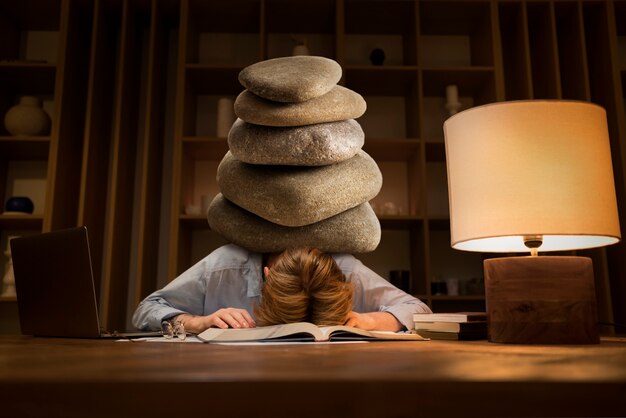The Science of Relaxation: Understanding Your Body’s Stress Responses
We’ve all been there—those moments when stress seems to take over and relaxation feels like a distant dream. But what if the key to unlocking true serenity lies in understanding the science behind our body’s stress responses? By exploring how our bodies react to stressors and learning how to manage these responses, we can cultivate a more peaceful existence. In this blog post, we’ll explore the fascinating science of relaxation and offer practical tips for managing stress effectively.
What is Stress?
Stress is a natural reaction that occurs when we face challenges or demands. It can be triggered by various factors, such as work pressure, financial worries, or relationship issues. When we encounter stress, our bodies activate the “fight or flight” response, releasing hormones like adrenaline and cortisol. This reaction is designed to help us tackle immediate threats but can become problematic when experienced too frequently.
Why Understanding Stress Matters
Understanding stress is crucial because chronic stress can have adverse effects on both our physical and mental health. It can lead to issues such as anxiety, depression, heart disease, and weakened immune function. By recognizing the signs of stress and addressing its causes, we can take proactive steps to protect our well-being.
The Body’s Stress Response System
The body’s stress response system is an intricate network involving the brain, hormones, and nervous system. When faced with a stressor, the hypothalamus in the brain signals the adrenal glands to release stress hormones. While this response is beneficial in short bursts, prolonged exposure to stress hormones can take a toll on our health. Consulting a professional, such as a psychiatrist in Salt Lake City, can help individuals understand and manage their stress responses effectively.
Types of Stress Responses
There are various types of stress responses, each affecting our bodies differently. Acute stress is the most common form and is often experienced when facing immediate challenges. Episodic acute stress is when someone frequently experiences acute stress, often due to a chaotic lifestyle. Chronic stress occurs when stressors persist over a long period, leading to ongoing tension and anxiety. Understanding these different responses can help us identify which type we are experiencing and address it accordingly.
Recognizing Stress Symptoms
Recognizing stress symptoms can empower us to take control of our well-being. Physical symptoms of stress may include headaches, muscle tension, fatigue, and digestive issues. Emotional symptoms may manifest as irritability, anxiety, or depression. Behavioral symptoms, such as changes in appetite or sleep patterns, can also indicate stress. By being mindful of these signs, we can take steps to mitigate their impact.
The Role of Relaxation
Relaxation is essential for counteracting the effects of stress. It helps lower heart rate, reduce blood pressure, and decrease muscle tension. Engaging in relaxation techniques can also enhance mental clarity and promote emotional well-being. By prioritizing relaxation, we can create a more balanced and fulfilling life.
Effective Relaxation Techniques
There are numerous relaxation techniques to explore, each offering unique benefits. Deep breathing exercises can help calm the nervous system and reduce stress. Progressive muscle relaxation involves tensing and relaxing different muscle groups to release tension. Mindfulness meditation encourages present-moment awareness and fosters a sense of peace. Experimenting with various techniques can help us discover what works best for us.
The Science Behind Meditation
Meditation is a powerful relaxation tool backed by science. Research has shown that regular meditation can reduce stress, improve concentration, and enhance emotional resilience. It achieves this by promoting the release of neurotransmitters like serotonin, which contribute to feelings of well-being. Incorporating meditation into a daily routine can lead to profound transformations in stress management.
Exercise and Stress Reduction
Physical activity is another effective way to alleviate stress. Exercise releases endorphins, known as “feel-good” hormones, which help improve mood and reduce anxiety. Engaging in regular exercise can also enhance sleep quality and boost self-esteem. Whether it’s going for a walk, practicing yoga, or hitting the gym, movement is a powerful antidote to stress.
Nutrition’s Impact on Stress
What we eat can significantly affect our stress levels. A balanced diet rich in fruits, vegetables, and whole grains provides the nutrients needed to support a healthy nervous system. Foods high in sugar and caffeine can exacerbate stress, so it’s wise to consume them in moderation. Staying hydrated and incorporating stress-reducing foods, such as salmon and almonds, can contribute to better stress management.
Seeking Professional Support
Sometimes, stress can become overwhelming despite our best efforts. Seeking professional support from a therapist, counselor, or psychiatrist can provide valuable guidance. They can help us develop coping strategies and offer insights tailored to our individual needs. In Salt Lake City, there are numerous mental health professionals available to assist individuals in managing their stress effectively.
Building a Stress-Resilient Lifestyle
Building a stress-resilient lifestyle involves making intentional choices to support our well-being. Prioritizing sleep, setting boundaries, and cultivating positive relationships are essential components. Engaging in hobbies, practicing gratitude, and nurturing a sense of purpose can further enhance resilience. By adopting these habits, we can create a life that is less affected by stress and more centered on joy.
The Journey to Serenity
The science of relaxation reveals that understanding our body’s stress responses is key to achieving serenity. By recognizing the signs of stress and implementing effective relaxation techniques, we can cultivate a life of balance and peace. Remember, seeking support from professionals, such as a psychiatrist in Salt Lake City, can provide valuable insights along the way. Start your journey to serenity today and discover the tranquility that lies within.
Keep an eye for more news & updates on Ny Heading!






